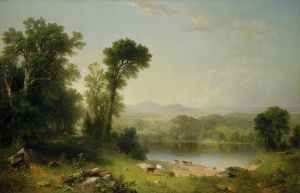Mifora
| Government |
|---|
| Republic |
| Capital |
| The Grand Imperial City of Mifora |
| Cities |
| Dunum, Silia, Tetia |
| Major Worship |
| Beory, Boccob, Heironeous, Istus, Lirr, Pholtus |
| Climate |
|---|
| Temperate |
| Exports |
| Artwork, cheese, fruits, grain, knowledge, leather, wine. |
| Imports |
| Coffee, cotton, rice, salt, silk, spices, sugar. |
Confusingly Mifora refers to both a country and a city. Attempts have been made to rename the country to Sunita, but without success. And to muddy things even more; Mifora is where the original Miforan Empire got its start.
It is unique in the world for the fact that the many small agricultural communities in this nation, together hold more power than the metropolis of Mifora, its capital.
The country is more technologically advanced than most other nations. Though this is not necessarily true for the countryside, the capital and the other large cities contains many academies, colleges and other centers of learning.
History
When the children of Empress Ateia split up the realm, most of what is now Mifora went to her son Inicus. A traditionalist, he was the most resistant of the siblings to the new ideas and he firmly intended to continue on as the new emperor of a (much) smaller Miforan Empire. His daughter, however, had other ideas.
Laelia Sevso was an idealist. She cared deeply about the common people and their plight. After many years of reading books and talks with her tutors she came to the conclusion that things needed to change for the betterment of the populace. But she also knew her father would never allow it.
The upheaval as the empire split was the moment to enact any kind of change, this was clear for anyone to see. And she was convinced that it was possible to have a bloodless coup that would allow her father to live out his years in the royal castle. Ah, the optimism of youth.
It turns out that she, and, to be fair, everyone else, had underestimated how different city-dwellers had become from those of the countryside. Even though students loved to discuss revolution, they, and everyone else in the large cities, did, when it actually came to it, not really enjoy a prospect where their opportunities would diminish for the betterment of the 'country bumpkins'.
Said peasants, however, were quite enthusiastic about a change of government once the call went out. Inicus had been slain the first night of the revolt but now the cityfolk were dragging their feet when it came to enacting real change. It didn't take long at all before 'a host of hayseeds' arrived at the gates of the Grand Imperial City of Mifora.
The armies were unable to chose a side in this conflict as they were far away (and, in some cases, otherwise occupied). And so marched the 'yokels' into the city and took possession of Mulsa Palace. Representatives of all of society met here and a new system of government was forged. The county was divided into shires and each of these elected an envoy who got a seat in the State Convocation which was to rule the country. As all the large cities were each just a single shire they lost most of their power but soon started to claw back influence.
Those on the eastern border of Dolac, when seeing what had happened in their neighboring country, petitioned to join. This was immediately granted and the country grew to its current size.
